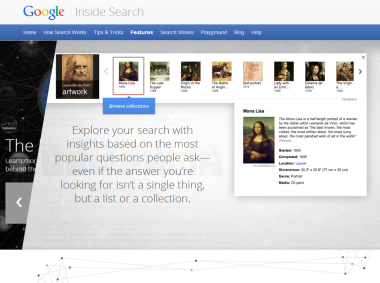Is it just me, or does it seem like yesterday we barely knew what the word ‘Google’ meant?
The evolution of search technology has progressed in leaps and bounds at what seems like lightning speed. It all started with simple keyword searches, where search engines produced results to phrases directed by users. Back then, this was the main approach for search engines to assign rankings to web pages.
Fast forward to semantic search, which uses machine intelligence to interpret what the intended meaning of words are so web searches become more relevant. In fact, some of the most used search engines and social media outlets are using this technology to help users learn, explore their interests, and make connections. This type of search has quickly crept into our lives, and many are pushing the technology towards new heights.
Think about how many people thirst for new knowledge who now head to the web to satisfy their curiosity. In 2013, there were 20 percent new Google searches, mostly because users have started writing sentences into search engines. Take a moment to think – do you search for “cheap hotels” or “cheap hotels in Hawaii in December”? These actions demonstrate people are now expecting search engines to work like natural language.
Lean Mean Answer Machines
 Screenshot taken July 2014
Screenshot taken July 2014Not only has Google implemented Hummingbird to help understand what users want, but they have also introduced the“Knowledge Graph”, which goes deeper than conventional search results. Bing also has a similar display with its tiles.
What’s so great about new semantic search is that, through validated structured data, they are able to give a better user experience. These results are great for displaying on mobile devices and wearable technologies.
What began as simple keyword searches is now making people’s lives so much easier. A great example is a user who follows a brand on Facebook, and a promotion appears in real-time when they place an item into their shopping cart online.
Using semantic search means machines are able to give customers access to information they didn’t even know they wanted.
So what’s next? Industry watchers believe interconnected devices will arrive soon at a home near you. It might mean your thermostat will adapt to different user preferences, or your refrigerator will make recipe recommendations based on ingredients you have in your fridge. If you’re like many of us who hate to clean, maybe one day there will be a vacuum cleaner that will turn on and clean automatically whenever it detects that you haven’t dusted in a while.
Is Content Still King?
The short answer is yes.
Responding to how users interact with content, Google is already starting to look at content around a link to establish relevancy, instead of taking cues from anchor text. It might actually start to understand what certain content is relevant for based upon the context.
What Does That Actually Mean?
For one, it means that your content strategy shouldn’t just depend on how many anchor texts you use, but how relevant your content is. Your brand and company need to think about how you can create relevant associations and keywords in order to capture the right kinds of audiences.
Secondly, you might not need to worry so much about links as much, as it will become less relevant as a ranking factor. If you don’t need to worry about links, it means that what words are actually on the page will count more than ever. Yes, you guess it, your content is pretty important.
What it boils to is search engines and their complex algorithms are trying to recognize quality over fluff. Sure, search engine optimization will make you more visible, but content is what will keep people coming back for more. You can safely say content will become a company asset because a company’s primary goal is to give value to their audience.
The Importance of Natural Language
Users crave answers to their burning questions and they want search engines to work like natural language. This means you can’t just slap content somewhere and expect users to come flocking. If your content isn’t unique or even well written, why would people come for more? What would you rather read, something you can read easily on your mobile device, or a long drawn essay on what type of wooden photo frames to use?
If users want search engines to work like natural language, you can bet they want web content to behave that way, too. Court them with your content and your audience will fall in love again and again.
You want those loyal followers to convert into customers. No, let me rephrase that. You need those loyal followers so they can convert into loyal customers.
That means good content will show you are an authority in your niche, and people will view your site as an important source of information. This in turn makes your rankings go higher. Not only that, but relevant content will have an effect on your sales. Think back to the promotion that magically lands in a customer’s shopping cart. That person will most likely make that purchase, instead of abandoning the shopping cart.
No matter how search engines will evolve, content will always be the main gateway to success online. You need to think carefully about how you manage your content and how you can make it even more relevant to your target niche in order to gain favorable rankings.
SEO as we know it is changing. A large part of the activities involved in creating an online presence for your business now falls under marketing and I believe semantic search needs to be part of your overall marketing plan. Do you?





